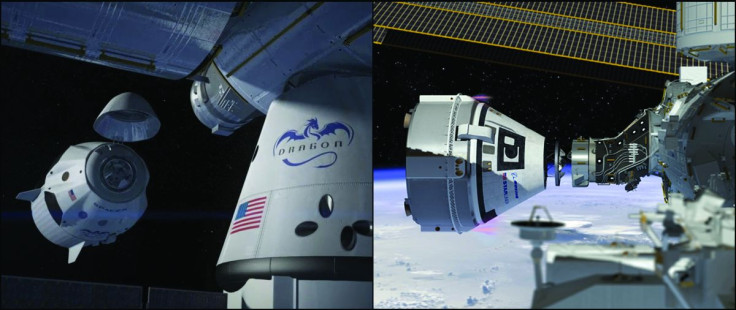NASA Awards Fresh Contracts To Boeing, SpaceX To Ferry Astronauts To And From International Space Station

NASA on Wednesday awarded four more contracts each to SpaceX and Boeing for crewed flights to the International Space Station (ISS). The contracts, announced under the space agency’s Commercial Crew Transportation Capability (CCtCap) program, bring the total number of missions awarded to SpaceX and Boeing to six each.
“Awarding these missions now will provide greater stability for the future space station crew rotation schedule, as well as reduce schedule and financial uncertainty for our providers,” Phil McAlister, director of NASA’s commercial spaceflight development division, said in a statement. “The ability to turn on missions as needed to meet the needs of the space station program is an important aspect of the Commercial Crew Program.”
SpaceX's first uncrewed flight test is scheduled for November 2017, and would be followed by its Crew Dragon capsule tests in May next year. Boeing, meanwhile, has scheduled the first crewed CST-100 Starliner test for August 2018.
Crewed missions to the ISS would begin once the companies receive flight certification from NASA.
“The Commercial Crew Program will help NASA get full operational use from the national laboratory for scientific research by increasing the number of astronauts on the space station, and allowing the crew members to dedicate more time to research,” the space agency said in the statement. “The commercial crew vehicles will transport up to four astronauts for NASA missions, along with about 220 pounds of critical cargo to the space station.”
Since the U.S. ended its space shuttle program in 2011, Russia’s Soyuz rockets have the only means of ferrying astronauts to and from the ISS. Under its current arrangement, NASA has to shell out nearly $80 million for every seat on the Soyuz rocket.
However, last year, Russia’s Roscosmos announced that it does not have any plans to send U.S. astronauts to the ISS after 2018. This means that unless SpaceX or Boeing are ready with their flagship capsules by then, U.S. presence on the space station would be directly impacted — at least temporarily.
“Returning human launch capabilities to U.S. soil underscores NASA’s commitment to the station and the research that the orbiting laboratory makes possible including the advancement of scientific knowledge off the Earth, for the benefit of those on the Earth and to prepare for future deep space exploration,” the space agency said.
© Copyright IBTimes 2024. All rights reserved.












